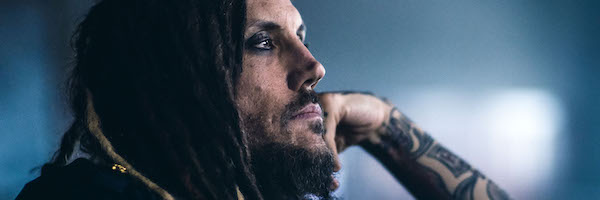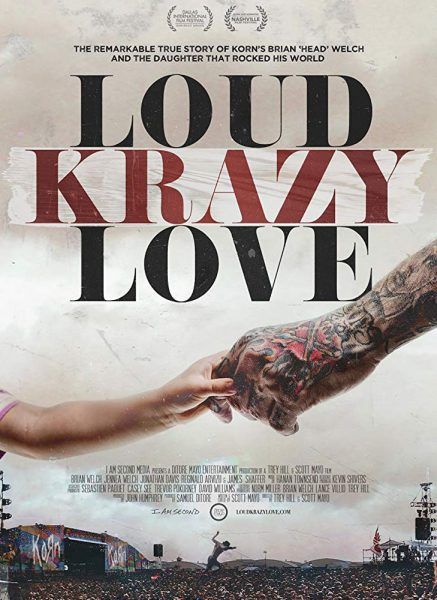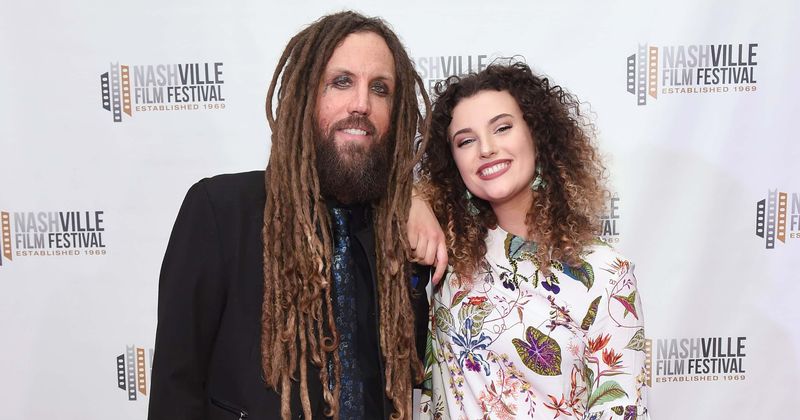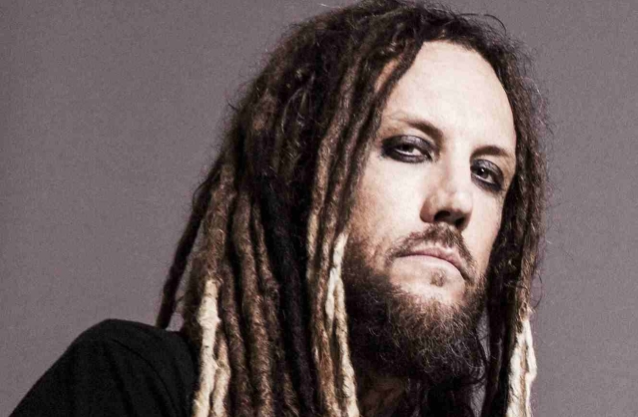In the latest candid interview, former Korn guitarist Brian "Head" Welch and his daughter, Jennea…

Brian “Head” Welch on ‘Loud Krazy Love’ & the Relationship with His Daughter Jennea
Directed by first-time feature filmmakers Scott Mayo and Trey Hill, the powerful and moving documentary Loud Krazy Love (available on digital and DVD) tells the remarkable true story journey that guitarist Brian “Head” Welch took, from becoming a global rock star, to being a full-blown drug addict, to wanting to be a good father, to discovering his own faith and spirituality, and what all of that meant for his future. It was a long winding road to sobriety that eventually led him back to his bandmates in Korn, eight years after he quit in 2005, and to a place with his daughter Jennea that they can both be proud of. It’s an unconventional story about an unconventional family, figuring out what works for them and embracing it.
During this 1-on-1 phone interview with Collider, musician Brian “Head” Welch (who, along with fellow Korn guitarist James “Munky” Shaffer, is considered to be one of the best heavy metal guitarists of all-time) talked about getting to a place where he could reflect on his own life experiences in such an honest way, what it’s like to watch the journey that he’s been on and to see how it’s affected those around him, how money doesn’t actually buy happiness, whether he’d thought about the repercussions of quitting Korn, the experience of being back with the band now, how the relationship between him and his daughter has evolved, finding a balance with his faith, and the hope that he’d like people to see in his story.
Image via Loud Krazy Love
Collider: I loved this film. The journey that you go on in it is incredible and sometimes shocking to watch. I so appreciate you being willing to put all of this out there.
WELCH: Right on. That means a lot. I appreciate you saying that.
How did this film come about, and how did you get to a place where you could make a documentary about your life and be objective about your experiences?
WELCH: It’s crazy. So many dramatic things have happened in my life and with the guys in Korn, from the successes to the traumatic effects of our lifestyle choices, whether it be substance abuse, or whatever, and when I left the band was probably the most dramatic. MTV was actually doing a show about spirituality, so they came to follow me around for a little bit and they got all of this footage. They ended up cancelling the show, and I ended up with the footage, so I thought it would be perfect to put something together, like a documentary. I started filming a little bit, off and on, for the next two years. I tried to put a documentary together a couple of times in ‘07, but the money ran out and people quit and there was all of this drama, so I gave up. I was like, “I don’t even want to do this. Documentaries are stupid. You can’t make money on them. I don’t want to do it.” And then, fast forward to five years ago, these people believed in me going back to Korn, and that was really dramatic, so they said, “What about doing a whole documentary on that? It could include your departure, and your return.” And then, it turned into being about me and my daughter because people just loved the family story more, so we re-edited it into what it is now.
At what point, along the way, were you able to get as self-reflective and honest as you are now? Do you feel like you always were able to do that, or did it take a shift for you to be able to really speak so openly about everything?
Image via Loud Krazy Love
WELCH: Oh, it was a massive shift because I was only a surface type of person and I never wanted to talk deep about anything. It was just about, “Hey, what’s up? How are you doing? Let’s have a barbecue and drink.” Even with my family, we just talked about surface things. I never wanted to go deep. I had all of these secrets about my drug addictions, depending on the year – cocaine one year, pills another year, meth another year. I would go on binges, and then I would quit, which made me feel better and like I wasn’t an addict because I’d not do it for awhile. And then, when I had the spiritual awakening, I decided to get real and deep with life, what the meaning of everything is, and what my focus would be. I realized really quick that it was to be a dad. That was number one, and not the band, the money, or any of that. I wanted to focus on being a dad.
Even just figuring that out seems like a huge step that not everybody can make.
WELCH: Yeah. I think the depression just pushed me to really start figuring things out. I realized that it was going to take a decade to get things to calm down and have some normalcy because my emotions were so out of control, with the drinking and the drugs. I thought that I was gonna be fixed overnight, or over a couple of years, but for me, it took a long time.
Now that the film is done and you’re at a very different place than you were, what’s it like to look back on it and see everything you went through, and also see what your bandmates, your parents and your daughter all have to say about it, as well?
Image via Loud Krazy Love
WELCH: It’s really crazy to see the journey. I know that it was focused on me, but my daughter had her own thing that she went through, that we shared in the film, and the other guys’ stories were similar to mine, though we didn’t get real deep into it. They went through their crazy, dramatic addictions and broken families, and all of that, so it was all of us. I just happened to be the one that told my story. Seeing everybody’s perspective was really crazy. I’m just thankful that I got through it. When I look at the movie and I hear people talk about it, it doesn’t sting anymore. All the pain is in the past and everything is a lot better now, with my daughter. We don’t have blow out fights. None of that goes on anymore. It’s really cool because we have conflicts, but we don’t have to freak out. That’s a lesson that I learned. The biggest part was the anger and the rage. When things go wrong, some of us go so deep into anger or depression, and I’ve learned how to find that balance, when things go wrong. It’s gonna be okay. We’re gonna get through it.
There’s a weird thing that always happens when you have success and money and fame because people think that you must happy, and you think that as long as you can achieve those things, it’ll solve all of your problems. At what point did you realize that’s just not the case?
WELCH: You said it perfectly there. A lot of people still think that. It was at the point when, probably 10 years into Korn, traveling the world and playing all of the shows and just doing the same thing, over and over, where the crowds were awesome and I was thankful, but I also felt like there had to be something more because I was tired. It just ended up just being normal life. Whatever anybody else does with their everyday life, that was my normal. So, just the monotony of the unhealthy lifestyle, mixed with playing and doing the same thing, over and over and over, and trying to stay on top, was tiring. It was about 10 years into it, when I said, “What’s going on here?”
Image via Loud Krazy Love
People really do believe that money can buy happiness, but it really can’t. If there are things that you haven’t dealt with, they’re still there, no matter how much money you have.
WELCH: Totally, and I learned that. Money can be good, if you have your foundation right and realize that it’s not everything. There’s a scripture that says, “I’ve learned the secret of being content, in all situations, whether being wealthy, or being in need.” I feel like I went through that. I learned that I can have peace while I’m in need and going through financial struggle, and when the money’s really good, I can not get into the bad situations where people can use you, or you start to get greedy, or you start to think that you’re better than people. Life is a learning process. It’s crazy that I’ve been on both spectrums, so high and so low.
When you left Korn, I remember, from the outside, it felt like it just came out of nowhere. Did it feel that way for you, or was it a decision that you had thought about for awhile?
WELCH: I had been thinking about it for awhile. It wasn’t, “Man, I’ve gotta leave the band.” It was, “I wish I could leave, but I can’t. I wish I could stop touring, but I can’t.” You can’t just leave a band. It was impossible, in my mind, to leave Korn. But when I had the spiritual awakening and I got sober, one day, I had the boldness come upon me. I was like, “I can quit. I can focus on something else, in my life. I don’t have to stay there just because it’s a successful rock band. I can leave.” One day, I couldn’t think of the option of leaving. I wished I could, but I didn’t have the strength to do it. And then, the next day, I was sitting in the kitchen and it was all over. I was like, “I’m leaving.” It was so sudden, it was crazy.
The day that you left Korn, if someone had told you that you’d find your way back to the band, would you have believed them? When you left, did you fully believe that you were done and that was it, or did you always think that there could be a future with them again, at some point?
Image via Loud Krazy Love
WELCH: It depends on the year. When I left, I was like, “Anything is possible.” But then, as the years went by, it would depend on the year. One year, I would think that there might be a future. But then, one of the band members would say something online that would piss me off and I’d be like, “I’m never going back to that band. You’re crazy! I’m not going back.” And then, three years later, I was back in the band.
Did you realize, at the time, how much leaving the band would hurt your bandmates? We see in the film that they were clearly in pain about you leaving. Did you know how much it would hurt them?
WELCH: I didn’t. I didn’t really think about that. I was so self-focused. I was coming off of massive drugs, and I Just needed to do something for my family. I was an idiot because I didn’t have empathy for them. I didn’t think about what it would make them feel like. I was just like, “I need to get away from these guys. They’re drug addicts, like me, and it’s unhealthy.” (Frontman) Jonathan [Davis] was sober by then, but I’d see him angry at people and I was like, “That’s not even the guy I used to know, and that we started the band with. That’s not him anymore.” I was pissed at them. I didn’t like them, but I didn’t like myself more than I didn’t like them. I didn’t like who they’d become, and I didn’t like who I’d become, so I wasn’t thinking of hurting their feelings, at all. I was just like, “Get me away from these really irritating people.” But as they grew up, and I was away from the band for eight years, so I could see that they’d grown up and they were wrecks just like me, and they needed help and needed to find peace in life, once I saw that, I felt bad. I was like, “Oh, man, what did I do?”
After everything that you went through, does it feel different to be in Korn now, to record with them again, and to walk out on stage and play live again? Are there things you appreciate about it now, that you didn’t or couldn’t, the first time around?
Image via Loud Krazy Love
WELCH: Totally! We’re all just so grateful that we have this band that people are still coming out to see. People are still checking us out, and they’re still really excited that we’re doing new things. We’ve got a summer tour with Alice in Chains, and we’ve never toured with Alice in Chains. People are buying tickets up and there’s still that excitement. We have a new album coming out. I never would have thought that I’d hit 49, and we’d still be relevant to our fans. I knew that Korn would still be doing something, but not at the level that where we’re at. It’s huge. It’s such a blessing. I thought 40 was old, when we were starting the band. It seemed so far away, but here we are now and it’s just really surreal. It’s such a cool thing that we have going. We’ve got some cool managers that have been with us for three years, and they’re really passionate hard workers. We have a great team and there’s great energy, and everyone is very grateful.
This film is equal parts rock documentary, faith testimonial and family drama. As part of that family drama, you were going through a lot of pain and heartache, but so was your daughter. How are things between you guys now? What’s it like for you to see where she’s at, in her own life?
WELCH: Everything changed when I took her to that school, Awakening Youth. We thought it would be a 12-month program, but they helped us communicate so much. The director there, Tiffany Claywell, stepped into that female, motherly role that my daughter needed. Every issue that we faced was communicated properly because she was a counselor at the school. Our communication was so smooth and so needed. Healthy communication is so powerful. It was not easy, but it helped so much that we decided that it was gonna be long-term. I bought a house near the school, just so that when I came into town, Jennea and me would have our own house, away from the school. She graduated high school and she’s still there, interning and working for the place while she’s going to college. It’s just amazing to see. Now we have the communication skills to talk, when we get together for a week and we butt heads, in some way. It’s a skill to talk and communicate. It’s been an amazing and unconventional experience, but our family is very unconventional. I never remarried, and that’s how it’s been. That’s what works for us. It was a unique situation for unique people, but it works somehow.
Image via Loud Krazy Love
One would think that the rock star part of your life and the faith part of your life would be at odds with each other, or at the very least, confuse each other, in some way. Do you feel like you’ve found a balance between those two very different things?
WELCH: Totally. There are still people and some fans who just don’t understand. There are the rockers that don’t get the spiritual thing, and the religious folks who get judgmental, but then there’s a group that gets Christ and the freedom and unconditional love that he has for every single person out there. I thank God that I found my way to the truth of that. I didn’t have to rely on some preacher or pastor to tell me things. With Christ’s message, you come through him to God. You don’t need to go to a priest or a pastor, or anything, because you get taught directly. And so, I did that. I went through the scriptures and I read books, and I learned it myself. There are so many people that are lost in religion, and you can get put in the same box as them, which is frustrating. But I’ve got a great balance now, and I’m not the only one. There are so many other musicians, athletes and rockers out there, on the road with us, that have found Christ and spiritual healing through him. I was the first weirdo, but now I’m more accepted and normal.
There’s been a lot of tragedy in the music world, and we’ve lost a lot of brilliant artists, way too soon, from a lot of very similar kinds of struggles. You went through quite a battle, but you came out on the other side, and you’re on the other side of it now. What do you hope people take from seeing this film, from hearing about your experience, and from seeing who you are now?
WELCH: I just hope they can see that there’s always hope, and that there ways to get through things, if you don’t give up. I know mental health is a big issue, and I’m not knocking anybody that has taken their life, but we’ve gotta help people to keep fighting. That’s it. The people that remain on the planet, I just want to help them keep fighting, so that they can wait it out and get through their mess. With me and my daughter, you see such a realistic and sometimes shocking but real-life look at a messy family who’s getting through things, so if we give people hope, they can see that God is not a religious thing. He’s everywhere, and we are all here to live and move and breathe in him. I just wanna make my little difference. I’m one little person in this big sea of people, that’s trying to make a difference. That’s all.
Image via Loud Krazy Love
Feeling like you can’t talk about it and not being able to communicate is a big part of that, and showing and talking about your experiences can help other people feel like they’re not quite as alone, which can be a positive thing.
WELCH: Yeah, that’s my hope. I don’t have another motive for this. Everybody knows documentaries don’t make big money. We might not make a dime off of this, but I’m working my butt off to get the word out there to help people. That’s the pay-off. I want people to feel changed, or to feel like they have hope and can keep going.
Loud Krazy Love is available on digital and DVD.
Read the article here.



